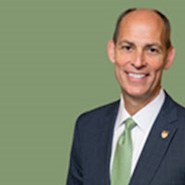
By Mona Savino & Thomas Smith, III
Situation
On October 10, 1973, the vice president of the United States, Spiro T. Agnew, resigned from office amid charges that he had taken kickbacks from local contractors when he served as the executive of Baltimore County, Maryland, and as the country's vice president. An extensive investigation by the U.S. Department of Justice was conducted into the kickback scheme, and numerous engineers and state officials testified as to its details.
As part of the investigation, several engineers, state officials, and businessmen were identified as participants in the scheme. At that time, state engineering contracts in Maryland were not awarded on the basis of public bids. The selection of engineers for the contracts was solely at the discretion of the governor and the members of the State Roads Commission. According to the report prepared by the Department of Justice, several engineering firms were awarded state contracts with the understanding that they were to pay Agnew a percentage of the amount of the contract. Some engineers made this payment through a go-between who also received a share of the payment, while others made the payment directly to Agnew while he was Maryland's governor and, later, the country's vice president. ASCE's Committee on Professional Conduct (CPC) decided to open an investigation of those involved in the scheme who were ASCE members to determine if they had violated the Society's Code of Ethics.
Question
Was it a violation of the code to participate in this kickback scheme as an engineer making the payments or as one accepting and sharing in the payments on behalf of the official who awarded the contracts?
This case was considered in the 1970s before the code was revised and adopted in its current form. For the sake of this discussion, the current code provisions will be substituted for those in existence at the time of this case. The guidelines to practice in category (a) of canon 5 state that "engineers shall not give, solicit, or receive either directly or indirectly any political contribution, gratuity, or unlawful consideration in order to secure work, exclusive of securing salaried positions through employment agencies." With regard to canon 6, the guidelines to practice in category (a) state that "engineers shall not knowingly act in a manner which will be derogatory to the honor, integrity, or dignity of the engineering profession or knowingly engage in business or professional practices of a fraudulent, dishonest, or unethical nature."
Discussion
The CPC investigated three members who made payments to Agnew in exchange for government contracts, as well as a member who acted as the go-between and took the payments to Agnew. The go-between had helped to determine which firms should be approached about payment and received a percentage of those payments. In all four cases the CPC recommended that the members be expelled from the Society, and the Board of Direction agreed.
Most of the evidence for the CPC investigations came from a report prepared by the Department of Justice. All of the engineers investigated by the CPC testified that there was a prevailing belief that firms would be unable to do business if they did not participate in this kickback scheme. The prevailing belief at the time was that only very well established firms or firms with a specialty in great demand could say no to the demand for payments. Otherwise, there was no choice but to pay.
It is interesting to note that another engineer was investigated by the CPC for his involvement in a similar scheme in which payments were made not to Agnew but to another Baltimore County executive. That member testified that the principal partner in his engineering firm told him that if they did not make the payments the firm's current contracts would be canceled. The principal demanded that the member contribute 20 percent of the payment because cancellation of those contracts would cause the firm to go out of business. The member testified that although he did contribute the requested 20 percent, he did not participate in the delivery of the payments.
The CPC recommended-and the board agreed-that this member be suspended for five years.
© ASCE, ASCE News, October, 2005



